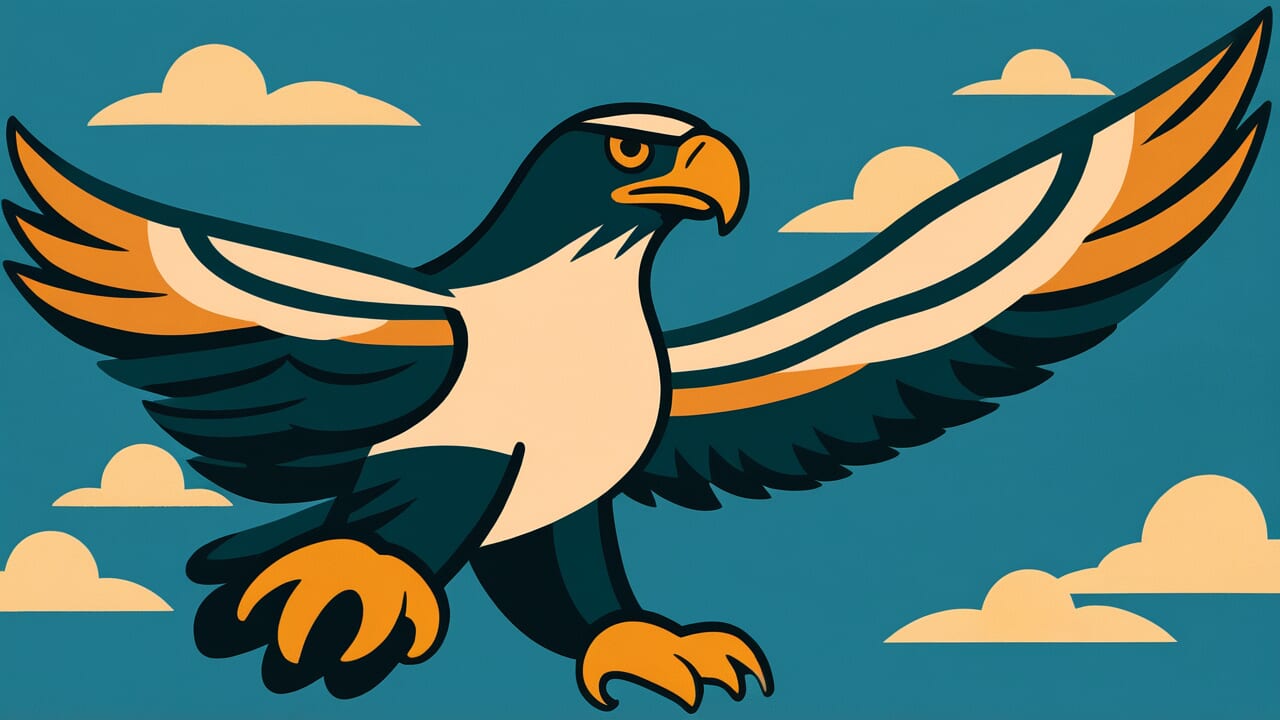How to Read “An eagle that doesn’t look up”
Ueminu washi
Meaning of “An eagle that doesn’t look up”
“An eagle that doesn’t look up” means that people in high positions don’t look down on those below them. It teaches that truly powerful people with high status don’t act intimidating toward those in weaker positions or lower ranks. Instead, they treat everyone with humility and kindness.
This proverb is used to praise the attitude of true leaders and capable people. It describes those who don’t use their position or power to look down on others. Instead, they maintain a fair and caring attitude toward everyone.
Even in modern society, we see this when company leaders or experienced experts treat newcomers and subordinates with respect. This proverb teaches us that true strength isn’t about stepping on the weak. It’s about having the inner peace to respect all people.
Origin and Etymology
No clear written records explain the origin of this proverb. However, it likely came from observing eagle behavior and Japanese people’s connection with nature.
Eagles are known as the top predators among birds of prey. They soar high in the sky and survey the ground with sharp eyes. Their presence shows true majesty. But interestingly, eagles never threaten others needlessly or chase smaller birds around. They don’t need to show off their power to weaker creatures.
The phrase “doesn’t look up” doesn’t mean ignoring those above you. Instead, it means not looking down on others. This observation led to the proverb. Truly strong people in high positions don’t need to show off their power. They don’t act arrogant toward the weak.
Japanese culture has long found human ideals reflected in animal behavior. Our ancestors saw the ideal leader in the eagle’s dignified yet humble attitude. This wisdom is captured in the proverb.
Interesting Facts
Eagles actually avoid unnecessary conflicts in nature. Despite their excellent hunting abilities, they rarely attack other birds beyond what’s needed. They often spend time quietly in their territory. This natural behavior matches the ideal leader in human society. This connection makes the proverb so convincing.
Many Japanese proverbs feature animals, but eagles appear relatively rarely. Hawks and cranes show up often. Eagles, with their dignity and strength, may have been treated as special beings.
Usage Examples
- That company president is an eagle that doesn’t look up – he speaks politely even to part-time students
- They say truly capable people are eagles that don’t look up, and watching her humble attitude proves it’s true
Universal Wisdom
“An eagle that doesn’t look up” offers deep insight into the relationship between power and character in human society. Why do people become arrogant when they gain status? And why don’t truly excellent people act this way? This proverb gives us a clear answer.
When people gain position or power, many feel anxious. They fear losing that position or worry their abilities aren’t enough. This anxiety appears as looking down on others. By intimidating people in lower positions, they try to confirm their superiority. This is actually a sign of insecurity.
On the other hand, people with real ability and confidence in their position don’t need such confirmation. Just as an eagle soaring high doesn’t need to chase small birds on the ground, true leaders don’t need to step on others to elevate themselves.
This proverb has been passed down because humans instinctively know how to distinguish true strength from false strength. We learn from experience that humble, gentle people often have deeper power than those who act superior. The desire to become such a person keeps this proverb alive.
When AI Hears This
Eagles have a visual field of about 270 degrees, yet they direct over 95 percent of their gaze toward the ground. This isn’t laziness but a rational strategy of optimal cognitive resource allocation. Bird of prey brains use enormous energy for visual information processing. Where they look directly affects survival.
In ecology’s “optimal foraging theory,” animals unconsciously calculate the costs and returns of searching for food. For eagles, the cost of watching the sky is high while the return is nearly zero. Almost no predators exist above eagles, and no prey flies above them. Meanwhile, abundant prey exists on the ground. Eagles concentrate their limited attention where the return on investment is highest.
This is called “niche optimization.” In ecosystems, each organism has a unique role and habitat. Eagles occupy the apex predator niche in the sky, specializing in catching ground prey. If they worried about what’s above, they’d lose their competitive advantage in this niche.
The same principle works in human society. Rather than wasting attention worrying about those above you, concentrate cognitive resources where you can deliver the most value. This ultimately creates overwhelming strength in that domain.
Lessons for Today
This proverb teaches us what true success means. In an age when showing off achievements on social media or feeling superior through comparison is easy, this lesson matters more than ever.
When you accomplish something, if you feel the need to show it off, that might not be genuine confidence yet. Real confidence is quiet and calm. You can treat juniors and beginners with respect without looking down on anyone. That’s proof you’ve truly grown.
At work, school, or home, we interact with people in various positions. How you treat those with less experience or lower positions reveals your true character. Like an eagle that doesn’t look up, soar high while respecting all beings. That’s the gift this proverb offers us today.



Comments